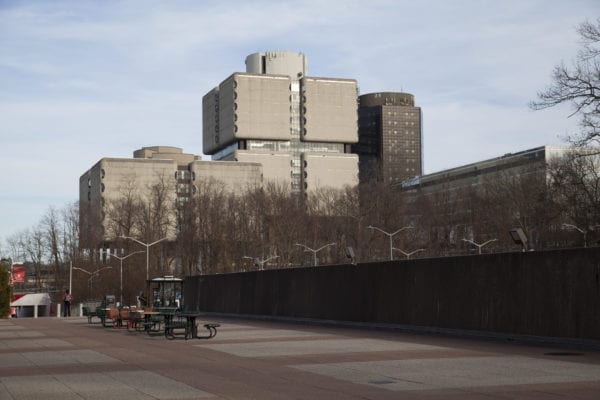
The upcoming application cycle for medical schools has been fraught with large-scale disruptions.
Pre-med students have had to navigate an abrupt shift to online learning, the cancellation of summer internships and the postponement of Medical College Admission Tests (MCAT) scheduled for May, a test that many spend months preparing for.
Some are hesitant to take advantage of university-wide grading policy changes, meant to accommodate students facing unique challenges during the coronavirus (COVID-19) pandemic. Stony Brook University, for instance, is offering students a Pass/No Credit (P/NC) option until June 3, according to a university-wide email sent by Vice Provost for Undergraduate Education, Charles L. Robbins.
The option has given students greater flexibility in determining how a particular course will affect their GPA. Students can opt for a “P” if they expect their final grade to be a “C” or higher, or an “NC” if they anticipate their final grade will fall below a C. Neither P’s nor NC’s will factor into their final GPA calculation.
Traditionally, medical schools require students to submit letter grades for their prerequisite classes; however, some have begun to rethink their admissions criteria for the upcoming admissions cycle.
The Renaissance School of Medicine posted a notice on their website that it would “accept pass/fail courses without prejudice” for courses taken during the Spring 2020 semester.
A virtual event hosted by the Pre-Professional Advising office on May 6 also helped to answer questions that have surfaced concerning the new grading option. The event, hosted on Zoom, was led by Lakshmi Ramsoondar-Ahmad, Jennifer Rodriguez, Kelly Haler and James Montren, who are all pre-professional advisors for students seeking admission to professional programs like medical and law schools.
“In regards to some of the health professions, many schools and application services are still working out the details on how [the pandemic] would affect the current cycle,” Ramsoondar-Ahmad said.
According to Ramsoondar-Ahmad, the Stony Brook University registrar will be including a notation on transcripts indicating that the Spring 2020 was impacted by COVID-19. The exact wording of the notation is still unknown.
“Students have the choice this semester to decide if they would like to P/NC one or more of their classes or decide to keep their letter grade,” Rodriquez said. “The general consensus we’ve heard from medical schools is that they’re willing to accept ‘P’s’ for prerequisites from this semester.”
Rodriguez added that students should examine how the letter grade would affect their cumulative GPAs before considering the P/NC option. If the grade will have a “positive effect,” students should rethink the P/NC option.
While the advisors all agreed that medical schools would be more flexible with their admissions criteria, many students were curious about the exact grade cutoff they should consider opting for a “P” on their transcript.
“A ‘P’ when you think you’re going to get a B or a B- is not necessary, “ Montren said. “I think a P would be favorable to a C+ cosmetically.”
Montren also explained that when analyzing applicants, admissions committees were more likely to review applications holistically, “connecting the dots” between MCAT section scores and grades achieved in prerequisite classes.
Ersha Kumar, a junior, double majoring in Psychology and Applied Mathematics and Statistics, said that the seminar provided “guidance and clarity.” While she’s keeping an open mind about the P/NC option, the decision will ultimately come down to her performance on finals.
Gowri Yerramalli, a junior biology major, is also keeping an open mind about the P/NC option.
Yerramalli believes that medical schools will be “accommodating and accepting” to the new grading option.
“I actually think it’s a very beneficial system at this point because we don’t know what other people are going through and how they’re dealing with [the pandemic],” Yerramalli said.
With the P/NC deadline pushed to June 3, students now have the ability to see their final grade in a class before choosing the P or NC option.
The “P/NC” grading option isn’t the only concern pre-med students have going into the upcoming application cycle for medical schools. The pandemic has not only disrupted their classes, but also led to the cancellation of hospital internships and immersive hands-on clinical experiences.
Kumar said she hoped to capitalize on her time over the summer to engage in physician shadowing, hospital volunteering, and gaining additional hands-on clinical experience.
Yerramalli said she wanted to conduct in-person scientific research and travel over the summer — however, her research will now be done remotely and her travel plans have been canceled.
The pandemic has been particularly troublesome for those taking the Medical College Admissions Test (MCAT), a critical component of a medical school applicant’s portfolio.
In light of COVID-19, MCAT examinations were canceled from March 27 through May 21. Test-takers now have the option of choosing between three different test dates: June 28, September 27, and September 28. On each testing date, examinees can choose to take an early morning, afternoon, or evening examination. The test, originally seven and a half hours, will be cut to five hours and 45 minutes to cater to the influx of students who will be testing.
Registration for these three dates opened on May 7, but signing up for the examination proved difficult for some.
According to a tweet sent on May 4 by the Association of American Medical Colleges (AAMC), the MCAT registration system was set to open between 6 a.m. and 12 p.m. EST, with the official open time to be officially announced on Twitter.
However, the Twitter announcement never came and the registration system system crashed before 8 a.m.
Yerramalli was one of the many students hoping to register for the examination. She was finally able to log on to the system at around 2:30 p.m., but officially claimed her seat close to two hours later.
“Overall, the experience was very frustrating because the AAMC told us that they had a set time that [the registration system] would be open, and it wasn’t,” Yerramalli said. “I think the [AAMC] was more focused on fixing the system as soon as possible.”
The AAMC officially apologized for the registration fiasco at 12:59 p.m. on May 7 on Twitter.
“We know it’s been a stressful day and we are sorry for the additional frustration we have caused,” the AAMC said.
Regardless of the troubles the pandemic has brought, Kumar is still hopeful.
“The pandemic as a whole has really shown me some of the gaps we have in our healthcare systems, and it’s inspired me to fill those gaps and bridge a connection between medicine and public health,” Kumar said.
















